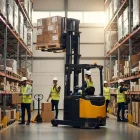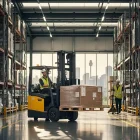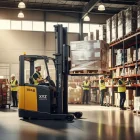What Are LF and LO Forklift Licences?
Navigating the world of forklift licenses can be daunting, especially when faced with the choice between LF and LO licenses. Understanding the differences between these two types of forklift licenses is crucial for anyone aspiring to operate forklifts professionally. In this article, we’ll break down the distinctions between LF and LO forklift licenses, explore the certification process, and help you determine which license you need for your career.
Before we dive into the specifics, let’s define what LF and LO forklift licenses are. These licenses are part of the high-risk work licenses required in many regions for operating certain types of forklifts. Each license serves a distinct purpose and is necessary for different kinds of forklift operations. Recognising the importance of these licenses is essential for maintaining workplace safety and adhering to legal requirements.
Having a clear understanding of these licenses can also assist employers in ensuring their workforce is adequately trained and certified. This not only helps in compliance with regulatory standards but also fosters a safer working environment. In industries where forklift operations are routine, distinguishing between these licenses ensures that tasks are assigned to appropriately trained personnel, minimising the risk of accidents and enhancing operational efficiency.
If you’re planning a career in warehousing or logistics, the right licence is essential. Many employers prefer candidates trained on equipment from a trusted Sydney forklift supplier, ensuring both safety and efficiency.
What Are LF and LO Forklift Licences?
An LF (Loadshifting Forklift) license allows you to operate a wide range of forklifts, including counterbalance forklifts and reach trucks. This type of license is more versatile and covers most forklift operations you’ll encounter in warehouses, factories, and other industrial settings. The LF license is widely recognised and valued for its broad applicability, making it a popular choice among forklift operators.
With an LF license, you can handle tasks such as loading and unloading goods, stacking materials, and transporting items within a warehouse. It’s an essential certification for anyone looking to work in environments where the movement of goods is a daily activity. The versatility of the LF license also means that operators can transition between different tasks and environments, providing greater job flexibility and opportunities for advancement.
What Is an LO Forklift Licence?
An LO (Order Picking Forklift) license, on the other hand, is specific to order picking forklifts. These forklifts, also known as stock pickers, are designed for lifting operators to elevated heights to access inventory on warehouse shelves. The LO license is required if your job involves picking and placing items from high shelves, a common task in large distribution centers and retail warehouses. This license is particularly crucial for roles where precision and safety at height are paramount.
The LO forklift differs from the typical counterbalance forklift as it requires the operator to be lifted with the load, making the role more specialised and focused on precision. Operators with an LO license are trained to handle the complexities associated with working at height, ensuring that they can maintain balance and control, thereby safeguarding both themselves and the inventory. This specialisation can lead to career opportunities in niche areas of the warehousing and logistics sectors, where order picking is a key component of operations.
What Are the Key Differences Between LF and LO Licences?
While both licenses enable you to operate forklifts, their scopes differ significantly. Here are the main differences:
- Type of Forklift: The LF license covers a broader range of forklifts, while the LO license is specific to order picking forklifts. This fundamental difference dictates the kind of environments and tasks each license holder can work in. An LF license is ideal for those who wish to engage in varied forklift tasks, whereas an LO license is tailored for roles that require working at heights.
- Job Function: An LF license is suitable for general forklift operations, whereas an LO license is tailored for roles involving order picking at height. The job functions of each license type align closely with the specific skills and competencies required for safe and effective forklift operation. Understanding this difference is crucial for individuals planning their career path in the logistics and warehousing sectors.
- Training Requirements: Training for an LF license is generally more comprehensive, covering various operational aspects, while LO training focuses on the specific skills needed for order picking. This difference in training reflects the unique operational demands of each license type. Both training programs emphasise safety and efficiency, but they cater to the distinct functionalities of the forklifts covered by each license.
What Is the Process for Obtaining an LF or LO Licence?
Obtaining an LF or LO forklift license involves a structured certification process. Here’s a step by step guide to what you can expect:
Before enrolling in a forklift certification course, ensure you meet the eligibility criteria. Generally, you must be at least 18 years old and possess basic English literacy and numeracy skills. Additionally, you may need to provide identification, such as a driver’s license or passport. Meeting these basic requirements ensures that all participants have a foundational level of understanding, which is critical for both safety and effective communication during training.
It’s also beneficial to have some prior experience or exposure to industrial environments, as this can enhance your learning experience. Employers may also have additional criteria, such as requiring a medical clearance, to ensure you are physically capable of performing the duties associated with forklift operation. Understanding and meeting these criteria beforehand will streamline the certification process and help you focus on acquiring the necessary skills.
Forklift training courses are essential for gaining the knowledge and skills required to operate forklifts safely. These courses are typically offered by registered training organisations (RTOs) and cover both theory and practical components. Engaging with both components ensures that operators are well rounded in their understanding of forklift operations, from both a technical and practical perspective.
- LF License Training: This training covers forklift operation, safety procedures, load handling, and equipment maintenance. You’ll learn about various forklift types and how to operate them in different environments. The comprehensive nature of LF training equips operators with the versatility needed to handle a range of scenarios they may encounter on the job.
- LO License Training: LO training focuses on order picking forklift operation, emphasising safety, load stability, and precision when accessing high shelves. This specialised training hones in on the specific challenges of working at height, preparing operators to manage the unique risks associated with order picking effectively.
Upon completing the training course, you’ll need to pass an assessment to demonstrate your competence. The assessment usually includes a written test to evaluate your theoretical understanding and a practical test to assess your ability to operate the forklift safely. Successfully passing these tests is a testament to your readiness to handle the responsibilities that come with forklift operation.
These assessments are designed to ensure that only qualified individuals receive certification, maintaining high safety standards within the industry. The practical test, in particular, is critical as it assesses your ability to apply theoretical knowledge in real world situations, ensuring you can operate forklifts safely and efficiently.
Once you pass the assessment, you’ll receive a statement of attainment. You can then apply for your high-risk work license through the relevant regulatory body in your region. The license is typically valid for five years, after which you’ll need to renew it. This renewal process ensures that operators stay current with industry standards and regulations, maintaining their competency over time.
Holding a valid license not only confirms your ability to perform forklift operations safely but also enhances your employment prospects, as employers prioritise certified operators. Keeping your certification up to date is a crucial part of professional development in the logistics and warehousing industries.
Which Forklift Licence Should You Choose?
Deciding which forklift license you need depends on the type of work you intend to do. Here’s a quick guide to help you choose:
- Choose an LF License if: You want the flexibility to operate various forklifts and work in diverse environments like warehouses and manufacturing plants. The LF license is ideal if your job involves handling different types of loads and performing a range of tasks. This license provides versatility, making it a valuable asset for those seeking diverse job opportunities across multiple sectors.
- Choose an LO License if: Your role is focused on order picking, especially in settings where accessing high shelves is a regular part of the job. The LO license is necessary if you will be working extensively with order picking forklifts. If precision, efficiency, and working at heights are key aspects of your job, the LO license is the appropriate choice.
Both LF and LO forklift licenses are part of the broader category of high-risk work licenses, highlighting their importance in maintaining safety standards in the workplace. Proper certification ensures that operators are equipped with the necessary skills to handle forklifts safely, reducing the risk of accidents and injuries. This focus on safety is crucial in preventing workplace incidents that can have serious repercussions for both employees and employers.
Why Are LF and LO Licences Important for Your Career?
Having the appropriate forklift license enhances your employability and career prospects, as employers are keen to hire certified operators who can contribute to a safe and efficient work environment. Certification demonstrates a commitment to professionalism and safety, qualities that are highly valued in the logistics and warehousing industries. By investing in forklift certification, you position yourself as a desirable candidate for a wide range of roles, opening up new career opportunities.
Final Thoughts: LF vs LO Forklift Licence
In summary, understanding the differences between LF and LO forklift licenses is crucial for anyone aspiring to work in the logistics and warehousing sectors. Whether you need an LF license for general forklift operations or an LO license for order picking, obtaining the right certification is essential for safety and career advancement. These licenses not only fulfill regulatory requirements but also enhance your professional credibility and operational competency.
Investing in the appropriate forklift training and certification will not only enhance your skills but also open up new job opportunities, ensuring that you are well prepared for the demands of the industry. Choose the license that aligns with your career goals and get started on the path to becoming a certified forklift operator today. By doing so, you’ll equip yourself with the tools necessary to navigate the complexities of modern logistics and contribute to the efficiency and safety of your workplace.




